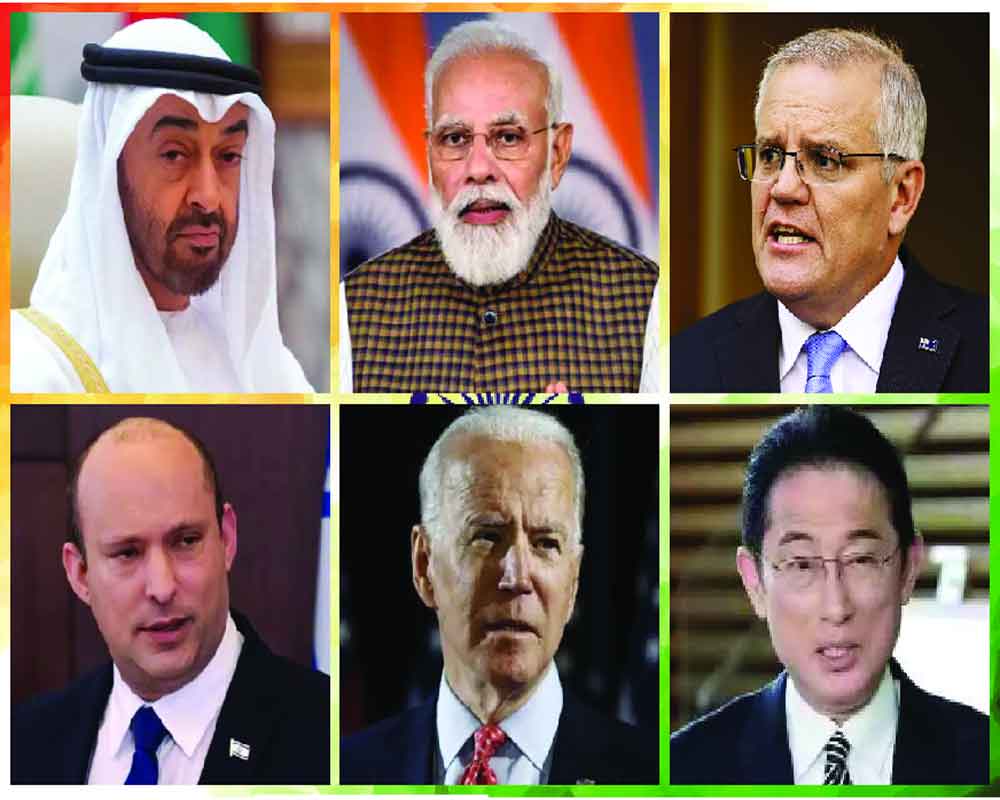India has a great opportunity at hand as it is the only nation along with the US to be part of two Quads
Recently, the leaders of India, the United States, Israel and the United Arab Emirates (UAE) came together for the first Heads of State summit meet for I2U2 or the West Asia Quad. The Indo-Pacific Quad which comprises India, the US, Japan, and Australia are the other Quad that today has become an important tool of India’s foreign policy. Interestingly both these ‘Quad’ groupings have the US and India as common members. While for the US this is more of a re-assertion of its desire to once again engage with the world actively and also to reclaim its mantle of a world leader, for India, this is a new kind of global positioning. It also offers India a great opportunity to then showcase its prowess as a strategic partner and emerging global leader not just in the Indo-Pacific but also in the Middle East region.
Much has been written about the Indo-Pacific Quad and how it brings together the four nations, in a bid to foster greater ties between themselves, and to counter and check on a China that seems to have no limits to its assertion of economic and military dominance. But the I2U2 or the West Asia Quad is still a new concept and exciting in the sense that it offers India an opportunity to build on its excellent bilateral ties with both Israel and the UAE. The strength here is also more titled in favor of economics and the outcome of the first Summit with its emphasis on food security and clean energy point in the same direction.
U.S. National Security Adviser Jake Sullivan on board Air Force One, en route to Israel with U.S. President Joe Biden, recently was asked as to what the objective was in bringing India "into so many issues" such as the Indo-Pacific Economic Framework, the Quad and I2U2.
He said India was one of the most ‘strategically consequential countries’ in the Indo-Pacific and therefore 'should 'play a central role in U.S. strategy. “India also had a long-standing relationship with the Gulf countries and Israel, he said, adding that the U.S. was looking forward to Mr. Modi’s participation in the I2U2 summit.”
His remarks indicate that the US is ready to accept a greater role and participation by India on the global scale.
India’s role in the Indo-Pacific Quad gets a little constrained since every member is fudging its bets against China. While the US looks at India, Japan, and Australia as an alternative to providing security in the region, the other member states have their own calculations to make vi’s-a-vi’s China. India prefers to play cautious and diplomatic despite the Chinese aggression on its borders.
Japan and China share an uncomfortable history and Japan is still struggling to come to terms with its own pacifist agenda post the Second World War. Australia is also unsure of how much to push against China, given that China is Australia’s biggest trading partner for both the export and import of goods.
For India, the biggest advantage in the West Asia Quad is its bilateral ties with Israel and the UAE. With a bilateral trade of $59bn, the UAE is already India’s third-largest trading partner after China and the US for 2019-20, as per the latest government data. India is also looking at concluding a free-trade pact with Israel. Both these factors make the West Asia Quad stronger and give a boost to the grouping.
For India, the membership in both the Quads then offers it a unique opportunity to assert its position as a global leader. India has been arguing about the need for a change in reforms in the United Nations Security for quite some time now. India wants it to be more representative of the new global order. India should get its rightful seat in the UNSC. But despite the promises of support from major world powers that does not seem to be happening in a realist world. However, what is happening and what is interesting is to see India emerge as a key member and player in two of the most significant groupings lately. The influence of course extends from the Indo-Pacific to the Middle East, giving India an edge that few other nations today can boast of.
(The author, a Delhi-based journalist and foreign affairs analyst, holds a Masters in International Relations from the American University in Washington DC. The views expressed are personal.)


























